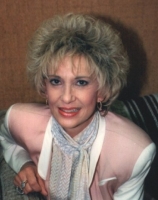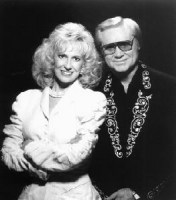Tammy Wynette Biography

Tammy Wynette
- Real name: Virginia Wynette Pugh
Tammy Wynette Biography

Virginia Wynette Pugh, known professionally as Tammy Wynette (May 5, 1942 - April 6, 1998), was an American country music singer-songwriter and one of country music's best-known artists and biggest-selling female vocalists. She was known as the "First Lady of Country Music" and one of her best-known songs, "Stand by Your Man," was one of the biggest selling hit singles by a woman in the history of the country music genre. Many of Tammy Wynette's hits dealt with classic themes of loneliness, divorce and the difficulties of male-female relationships. Her songs reflected her often-troubled romantic life (she married five times). But her willingness to share her joys and sorrows in song and her passionate, tear-in-every-note delivery endeared her to millions. During the late 1960s and early 1970s, she dominated the country charts, scoring 17 number one hits. Along with Loretta Lynn, Dolly Parton and Barbara Mandrell she defined the role of female country vocalists in the 1970s. Her 1969 marriage to legendary country singer, George Jones (which would end in divorce in 1975) created the first country music couple. They recorded a series of duet albums and singles, which charted throughout the 1970s, concurrent to their respective solo hits.

She attended Tremont High School, where she was an all-star basketball player. A month before graduation, she married her first husband, Euple Byrd. He was a construction worker, but had trouble holding down a job, and they moved several times. One of their homes had no running water. She worked as a waitress, receptionist, and a barmaid, and also worked in a shoe factory. In 1963, she attended beauty school in Tupelo, Mississippi, and became a hairdresser; she would renew her cosmetology license every year for the rest of her life, just in case she should have to go back to a daily job. She left her first husband before the birth of their third daughter. He did not support her ambition to become a country singer, and, according to Wynette, told her "Dream on, Baby." Her baby developed spinal meningitis and Wynette tried to make extra money by performing at night. In 1965, Wynette sang on the Country Boy Eddie Show on WBRC-TV in Birmingham, Alabama, which led to some appearances with Porter Wagoner. In 1966, she moved with her three girls from Birmingham to Nashville, Tennessee, where she attempted to get a recording contract. After being turned down repeatedly by every other record company she'd met with, she auditioned for producer Billy Sherrill. Sherrill, who was originally reluctant to sign her, decided to do so, her after finding himself in need of a singer to cover a song given to him, "Apartment No. 9". When Sherrill heard Wynette sing it, he was impressed and decided to sign her to Epic Records in 1966. Once she was signed to Epic, Sherrill suggested she change her name to make more of an impression. According to her 1979 memoir, Stand by Your Man, during their meeting, Wynette was wearing her long, blonde hair in a ponytail, and Sherill noted that she reminded him of Debbie Reynolds in the film "Tammy and the Bachelor," and suggested "Tammy" as a possible name; thus she became Tammy Wynette. Her first single, "Apartment No. 9" (written by Bobby Austin and Johnny Paycheck), was released in December 1966, and just missed the Top 40 on the Country charts, peaking at No. 44. It was followed by "Your Good Girl's Gonna Go Bad," which became a big hit, peaking at number three. The song launched a string of Top Ten hits that ran through the end of the '70s, interrupted only by three singles that didn't crack the Top Ten. After "Your Good Girl's Gonna Go Bad" was a success, "My Elusive Dreams", a duet with David Houston, became her first number one in the summer of 1967, followed by "I Don't Wanna Play House" later that year. "I Don't Wanna Play House" won Wynette a Grammy award in 1967 for Best Female Country Vocal Performance, one of two wins for Wynette in that category.

During 1968 and 1969, Wynette had five number one hits — "Take Me to Your World," "D-I-V-O-R-C-E," "Stand by Your Man" (all 1968), "Singing My Song," and "The Ways to Love a Man" (both 1969). [4] "Stand by Your Man", which was reportedley written in the Epic studio in just fifteen minutes by Billy Sherrill and Wynette herself, the song was released at a time when the women's rights movement was beginning to stir in the U.S. The message in the song that said a woman should stick to the side of her man, despite his faults of being weak and adulterous, stirred up controversy and was originally criticized in the beginning, and became a lightning rod for feminists. However, the song became very successful, reaching the top spot on the Country charts, and was also a Top 20 pop hit, peaking at No. 19 on the Billboard pop charts in 1968, Wynette's only Top 40 pop hit as a solo artist on the pop charts. In 1969, Wynette won the Grammy award for Best Female Country Vocal Performance for "Stand by Your Man", and has now been according to critics, considered a "classic" or Country music "standard" to record. Wynette earned a Gold record (awarded for albums selling in excess of 500,000 copies) for "Tammy's Greatest Hits" which was certified in 1970 by the RIAA. The album would later be awarded Platinum record status (awarded for albums selling in excess of 1,000,000 copies) in June 1989. In 1970, director Bob Rafelson used a number of her songs in the soundtrack of his 1970 film Five Easy Pieces. During the early 1970s, Wynette, along with Loretta Lynn (who was equally popular around the same time) ruled the country charts, and was one of the most successful female vocalists of the genre. During the early 1970s, number one singles included "He Loves Me All the Way" "Run Woman, Run" and "The Wonders You Perform" (all from 1970), "Good Lovin' (Makes it Right)", "Bedtime Story" (both 1971) "My Man (Understands)", "'Til I Get it Right" (1972), and "Kids Say the Darndest Things" (1973). One of them, "The wonders you perform",was a sensational top hit in Italy in 1971,thanks to Ornella Vanoni,who recorded the song in a very good Italian version, "Domani è un altro giorno" ("Tomorrow is another day"),whose text was written by Giorgio Calabrese, one of the most important Italian authors. Concurrent to her solo success, a number of her duets with Jones reache the top ten on the U.S. country singles charts during this time, including "The Ceremony" (1972), "We're Gonna Hold On" (1973), and "Golden Ring (1975). In 1968, Wynette became the second female vocalist to win the Country Music Association Awards' "Female Vocalist of the Year" award, later winning an additional two other times (1969 and 1970). For nearly two decades, Tammy held the record for most consecutive wins, until 1987 when Reba McEntire won the award for the fourth consecutive time.

Wynette was married to George Jones from 1969 - 75 (she had divorced her second husband earlier in 1969). Even after their 1975 divorce (due largely to Jones' alcoholism), their professional collaboration continued with regularity through 1980; years later in 1995, they made a reunion album entitled One . It was well received, although it didn't achieve their earlier chart success. Jones and Wynette had one daughter together, Tamala Georgette, born in 1970. In 1976, after having her public divorce from Jones the previous year, Wynette recorded, "'Til I Can Make It on My Own". Often said by music critics to be about her break-up from Jones and moving on with her life, the song reached No. 1 on the U.S. country singles charts, and No. 84 on the pop singles charts, becoming her first single in eight years to enter the pop charts. Often considered to be one of her signature songs, it more or less helped Wynette's career after her divorce, showing she could remain popular. It was recorded two years later as a duet by Kenny Rogers and Dottie West, whose version reached No. 3 on the country singles charts in 1979. In 1976, Wynette had another No. 1 as a solo artist, "You and Me", which became her final No. 1 as a solo artist. Her last No. 1 came as a duet with George Jones in early 1977 titled, "Near You". Following 1976, Wynette's popularity slightly slowed, however, she continued to reach the Top 10 until the end of the decade, with such hits as "Let's Get Together (One Last Time), "One of a Kind" (both 1977), "Womanhood" (1978) "No One Else in this World" and "They Call It Makin' Love" (both 1979). She had a total of 21 number one hits on the U.S. country singles charts (17 solo, three with Jones, and one with Houston). Along with Loretta Lynn, Dolly Parton, Dottie West, and Lynn Anderson, she helped redefine the role and place of female country singers. Beginning in the early 1980s, however, her chart success began to wane, though, she did continue to have top-20 hits during this period, including, "Starting Over" and "He Was There (When I Needed You)" (both 1980), a cover of the Everly Brothers' hit "Crying in the Rain" (1981), "Another Chance", "You Still Get to Me in My Dreams" (both 1982), and "A Good Night's Love" (1983). A 1985 cover of the '70s Dan Hill hit "Sometimes When We Touch", performed with Mark Grey, reached number 6 in 1985. In 1982 she recorded a track with The Ray Conniff Singers, a rendition of "Delta Dawn", in order to be included in the Conniff's duets album "The Nashville Connection", but ultimately the track didn't enter. Meanwhile, her medical problems continued, including inflammations of her bile duct. In 1986, she acted on the CBS TV soap opera Capitol. In 1988, she filed for bankruptcy as a result of a bad investment in two Florida shopping centers. Wynette's 1987 album Higher Ground featured a neotraditional country sound, and was both a critical and relative commercial success. The album featured contributions from Vince Gill, Ricky Van Shelton, Rodney Crowell, Ricky Skaggs, Emmylou Harris, and The O'Kanes. [6]Two of the singles released from the album, "Your Love" and "Talkin' to Myself Again", reached the top-twenty on the U.S. country singles charts; a third single, "Beneath a Painted Sky" (featuring duet vocals from Emmylou Harris) reached number 25 in early 1988 (it would ultimately be Tammy Wynette's final top-40 country single). Although she was still a name remembered in popular culture (the 1980s game show Press Your Luck had a country-singing Whammy known as "Tammy Whamette").

She recorded a song with the British electronica group The KLF in late 1991 titled "Justified and Ancient (Stand by the JAMs)," which became a No. 1 hit in eighteen countries the following year, and reached No. 11 on the Billboard Hot 100 in the United States. The song gave Wynette a new following, and was her highest-charting single on the Billboard Pop charts. In the video, scrolling electronic titles said that "Miss Tammy Wynette is the first lady of country music." Wynette appeared in the video seated on a throne. In 1992, future First Lady Hillary Rodham Clinton said during a 60 Minutes interview that she wasn't "some little woman, standing by my man and baking cookies, like Tammy Wynette." The remark set off a firestorm of controversy and Wynette demanded, and received, an apology from Clinton. (Hillary Clinton's remark aside, Wynette was nonetheless a Clinton supporter, and later performed at a Clinton fundraiser.) In 1990, Heart Over Mind was released and showed that Wynette's popularity on radio was declining. The album yielded no Top 40 Country hits, although numerous singles were released between 1990 and 1991, including a duet with Randy Travis titled, "We're Strangers Again". The 1993 album Honky Tonk Angels gave her a chance to record with Dolly Parton and Loretta Lynn for the first time; though yielding no hit singles (mainstream country radio had long since stopped playing artists approaching or over 50), the album did well on the country charts and even reached number 42 on the Billboard Pop Charts. The one single that was released from the album, a cover of "Silver Threads and Golden Needles" peaked outside the Country Top 40 in 1993. The following year, she released Without Walls, a collection of duets with a number of country, pop and rock and roll performers, including Wynonna Judd, Elton John, Lyle Lovett, Aaron Neville, Smokey Robinson, Sting and a number of others. An album cut titled, "Girl Thang", a duet with Wynonna Judd, reached No. 64 in 1994, but no singles were released from this album. Wynette also designed and sold her own line of jewelry in the 1990s. In 1995, she and George Jones recorded their first new duet album in fifteen years titled, One, which spawned a single of the same name. The single was the duo's first music video together. They last performed together in 1997 at Concerts in the Country Lanierland, Georgia .Wynette lent her vocals on the UK #1 hit Perfect Day in 1997, which was written by Lou Reed.

